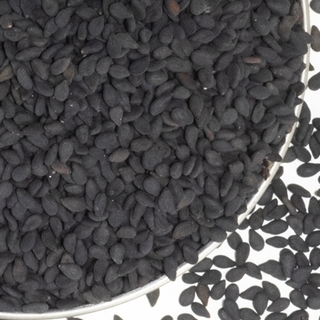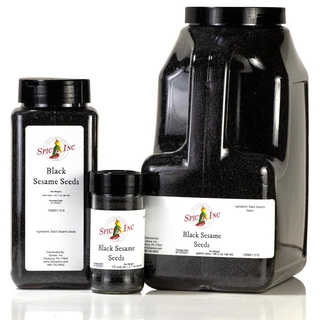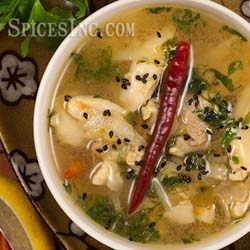Black Sesame Seeds




Black Sesame Seeds
Black Sesame Seeds are also called black sesame seeds, black sesame, or black sesame seed. They are small, teardrop shaped seeds, and contain 40-60% volatile oil by weight.
One of the oldest seed spices known to man, wild sesame seeds are thought to have originated in Africa, but it was domesticated in India circa 3500-3000 BC.
Sesame seed varieties differ in whether or not they are hulled. Black seeds still have their hull, while white seeds have had the dark hull removed. The lighter color seeds are more frequently found in Middle Eastern and Western cuisines, while the black seeds are more popular in Asian cuisine.
Black Sesame Seeds are popular with:
- brewpubs;
- American restaurants;
- cafes;
- seasoning companies;
- independent spice shops;
- olive oil shops; and
- sauce and salsa manufacturers
We also carry White Sesame Seeds and Toasted Sesame Seeds
Flavor Profile
Black Sesame Seeds have a nutty, earthy, slightly bitter taste.
How To Use
Black Sesame Seeds add nutty depth to Thai Basil Chicken Soup and a terrific crunch to Spicy Thai Noodles. They’re a wonderful garnish for Korean Cucumber Salad. Sprinkle over Smoky Pork Wontons or Asian Chicken Lettuce Rolls. Add extra texture to Spicy Cabbage Slaw.
Black Sesame Seeds are often used to flavor stir-fry and rice dishes, as a topping for breads and crackers, in breading for chicken or fish, with vegetables like zucchini, eggplant, and radish. Pair with garlic, ginger, lemongrass, lime, orange, apple, clove, soy sauce, fennel, star anise, and chile.
| Also Called | Black seeds, black sesame, or black sesame seed |
| Species | Sesamum indicum |
| Ingredients | sesame seeds |
| Flavor Profile | Nutty, earthy, slight bitterness |
| Oil content | 40-60% |
| Recommended Uses | Stir fry, rice dishes, soups, noodle dishes, vegetables, salad, bread |
| Cuisine | Asian, Chinese, Thai, Indian |
| How To Store | Airtight container in a cool, dark place |
| Shelf Life | 1-2 Years |
| Country of Origin | India |
Nutrition Facts
Serving Size1 tsp
Amount Per Serving
Calories11
% Daily Value*
Total Fat1g1%
Saturated Fat0g0%
Trans Fat0g
Polyunsaturated Fat0g
Monounsaturated Fat0g
Cholesterol0mg0%
Sodium0.0mg0%
Total Carbohydrate0.4g0%
Dietary Fiber0.4g1%
Total Sugars0.0g
Added Sugars0g0%
Sugar Alcohol0.0g
Protein0.4g0%
Vitamin D0mcg0%
Calcium0mg0%
Iron0mg0%
Potassium9mg0%
*The % Daily Value (DV) tells you how much a nutrient in a serving of food contributes to a daily diet. 2,000 calories a day is used for general nutrition advice. These values were calculated and therefore are approximate. For more accuracy, testing is advised.






